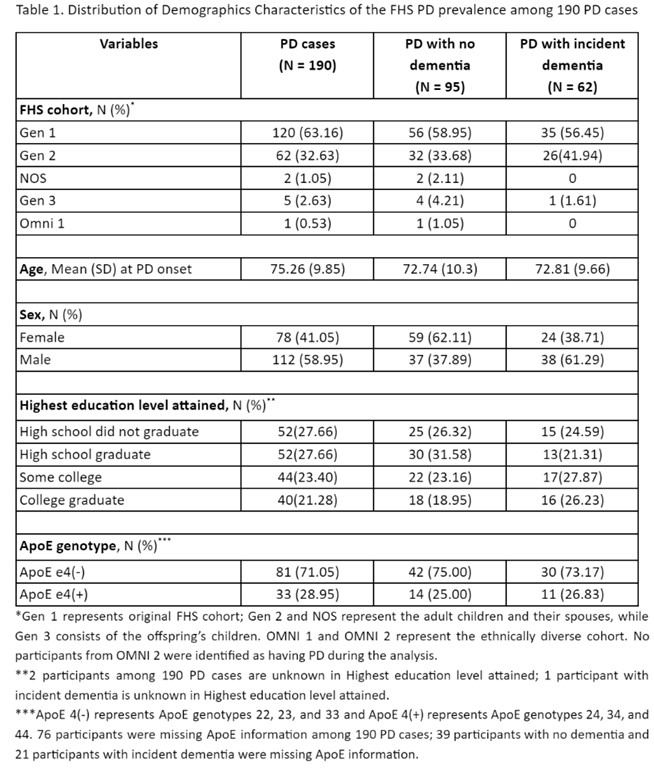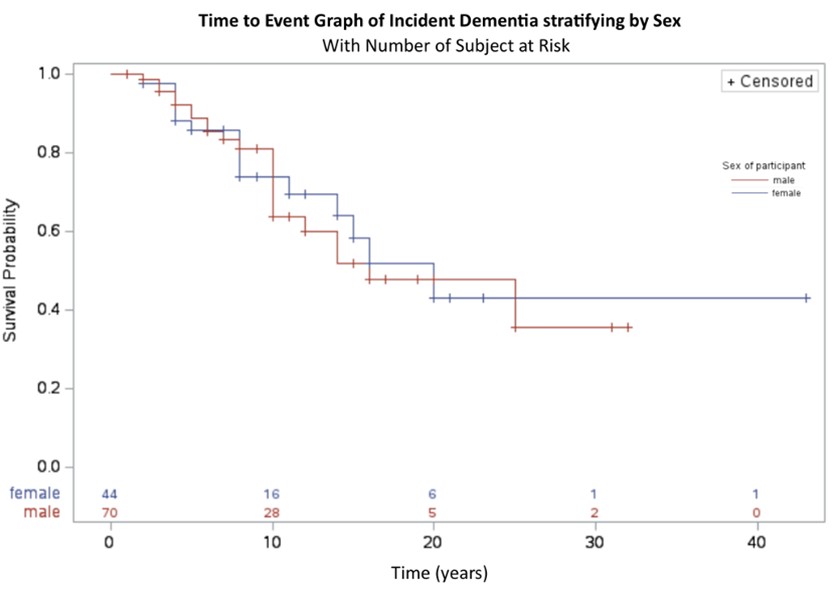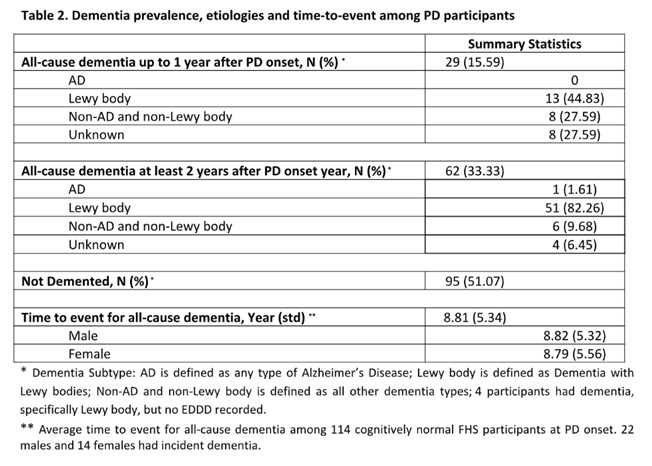Category: Parkinson's Disease: Cognitive functions
Objective: To examine incident and prevalent dementia cases in individuals with Parkinson’s Disease (PD) within a longitudinal population-based study
Background: Longitudinal studies have found that individuals with PD face up to 6 times higher risk of developing dementia than age-matched peers without PD [1]. However, the reported incidence and etiologies of dementia among individuals with PD may be biased, as many longitudinal studies of PD and cognitive impairment occur in highly selected PD samples [2]. We identified incident and prevalent cases of dementia in Framingham Heart Study (FHS) participants with PD.
Method: The original FHS cohort was recruited in 1948. Their offspring and spouses were recruited in 1971. A third generation, consisting of the offspring’s adult children, joined in 2002. Ethnically diverse cohorts were recruited in 1994 and 2003. Individuals underwent serial neuropsychological assessments and an extensive clinical history. Dementia diagnoses, based on DSM IV criteria, and PD diagnoses according to the UK Parkinson’s Disease Society Brain Bank (UKBB) were adjudicated by neurologists and neuropsychologists. During adjudication, dementia was categorized as incident dementia if diagnosed after PD onset, and prevalent dementia if dementia onset occurred before PD symptoms and diagnosis. Time to dementia was analyzed with Cox regression models assuming proportional hazards, with time since diagnosis as the underlying time variable, and stratified by sex.
Results: The demographic characteristics of the 190 participants with PD adjudicated until December 2022 are shown in Table 1. Mean age at PD onset was 75.3 years. 33 prevalent and 62 incident cases of dementia were found. The time to incident dementia is shown in Figure 1. There was no association between sex and incident dementia. Among cognitively normal participants at the time of PD onset (n=114), 36 developed incident dementia with a mean time of 8.81 years [table 2]. Dementia with Lewy-Body (DLB) was the most common incident and prevalent dementia type.
Conclusion: This study describes incident dementia in individuals with PD in FHS, with a significant percentage developing dementia early in the disease course that might be more appropriately classified as DLB. Further studies linking cases to post-mortem diagnoses will be valuable in clarifying the etiologies of incident dementia in this cohort.
Distribution of Demographics Characteristics
Time to Incident Dementia Stratified by Sex
Dementia Prevalence, etiologies and Time to Event
References: [1] Perez, F., Helmer, C., Foubert-Samier, A., Auriacombe, S., Dartigues, J. F., & Tison, F. (2012). Risk of dementia in an elderly population of Parkinson’s disease patients: a 15-year population-based study. Alzheimer’s & dementia: the journal of the Alzheimer’s Association, 8(6), 463–469. https://doi.org/10.1016/j.jalz.2011.09.230
[2] Aarsland, D., Batzu, L., Halliday, G. M., Geurtsen, G. J., Ballard, C., Ray Chaudhuri, K., & Weintraub, D. (2021). Parkinson disease-associated cognitive impairment. Nature reviews. Disease primers, 7(1), 47. https://doi.org/10.1038/s41572-021-00280-3
To cite this abstract in AMA style:
J. Dookhy, Y. Li, A. Gurnani, S. O'Shea, S. Frank, R. Au, J. Mez, Y. Liu, TFA. Ang, L. Shih. Incident & Prevalent Dementia in Individuals with Parkinson’s Disease in the Framingham Heart Study [abstract]. Mov Disord. 2024; 39 (suppl 1). https://www.mdsabstracts.org/abstract/incident-prevalent-dementia-in-individuals-with-parkinsons-disease-in-the-framingham-heart-study/. Accessed April 18, 2025.« Back to 2024 International Congress
MDS Abstracts - https://www.mdsabstracts.org/abstract/incident-prevalent-dementia-in-individuals-with-parkinsons-disease-in-the-framingham-heart-study/



